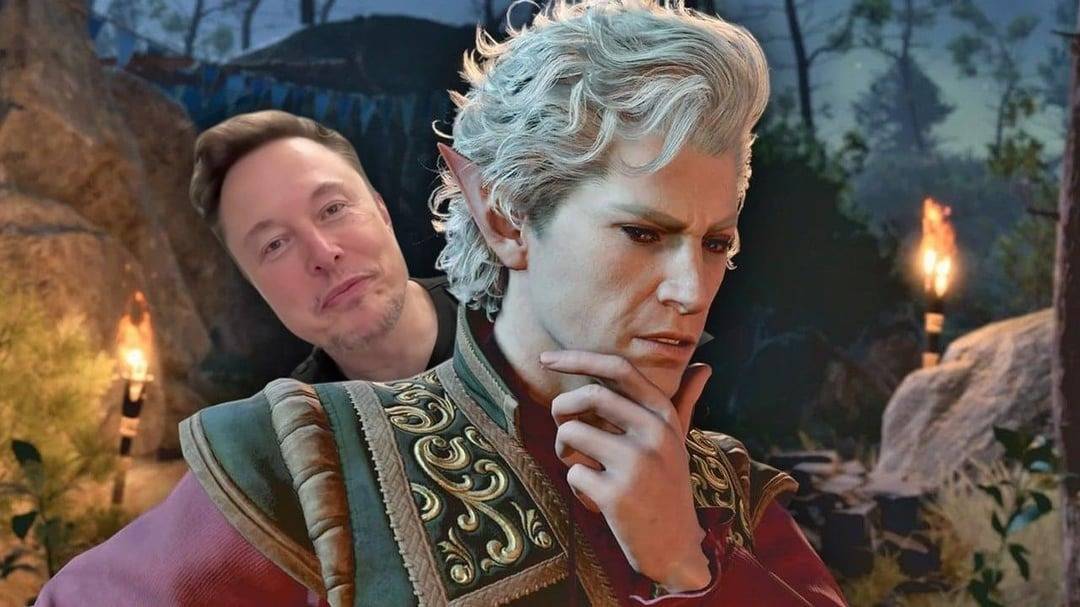Larian Studios Criticizes Elon Musk’s AI Game Initiative: The Quest for ‘Human-Human Expression’ Over Algorithm
Popular Now
 Toca Boca World
Toca Boca World
 Stumble Guys
Stumble Guys
 Schedule I
Schedule I
 Valorant
Valorant
 Sonic the Hedgehog™ Classic
Sonic the Hedgehog™ Classic
 Geometry Dash
Geometry Dash
 Minecraft
Minecraft
 Fall Guys
Fall Guys
 Fortnite
Fortnite
 Candy Crush Saga
Candy Crush Saga 
In a powerful rebuke that has reverberated across the global gaming industry, the publisher behind the critically acclaimed masterpiece, Baldur’s Gate 3, has openly criticized tech mogul Elon Musk’s ambitious plans to release an AI-generated video game by 2026. Michael Douse, the Publishing Director at Larian Studios, did not mince words, calling the initiative another potential “cash grab” and arguing that artificial intelligence will not solve the fundamental challenges plaguing the modern video game landscape.
The core of Douse’s argument, made public on social media, champions human creativity and artistic vision against the perceived pursuit of ‘mathematically produced’ content. This statement comes at a crucial time when the use of Generative AI in content creation is a hot-button issue, pitting cost-cutting corporate strategies against the value of human craft and labor.
H2: The Critique of ‘Mathematically Produced’ Gameplay Loops
The critique from Larian Studios—a company synonymous with deep, hand-crafted RPG experiences and unparalleled player freedom—is a direct challenge to the high-tech, venture capitalist-backed vision promoted by Musk’s xAI studio. Douse contends that the industry’s true need is not for quicker, cheaper, or more “efficient” development cycles, but for genuine creative direction.
- The Industry’s True Problem: Douse highlights that the primary issue is a “lack of cogent direction,” stemming from failures in leadership & vision, not a lack of tools. He suggests AI, in its current form, only distracts from this deep-seated corporate malaise.
- The Demand for Worlds: What players genuinely seek, according to the director of the company that delivered one of the best RPG releases in history, are “more expressions of worlds that folks are engaged with, or want to engage with,” not “mathematically produced, psychologically trained gameplay loops.” This emphasis on ‘expression’ reinforces Larian’s philosophy of putting player experience and narrative depth first.
- Avoiding the VC ‘Cash Grab’: Douse explicitly labeled the trend of banking on emerging technologies like Virtual Reality (VR), cloud gaming, and now generative AI as “VC cash grab.” He asserts that the focus should shift entirely from short-term financial gains to long-term sustainability and respect for the creative process.
This stark contrast in development philosophy—the six-year, human-intensive labor behind Baldur’s Gate 3 versus a fast-tracked, algorithm-dependent project—serves as a powerful commentary on the future trajectory of AAA gaming. The discussion is no longer theoretical; with a 2026 release target, Musk’s project is set to be a real-world litmus test for the commercial viability and artistic merit of fully AI-generated content.
H2: The Essential Role of the Human Touch in Video Game Development
The debate ultimately zeroes in on a philosophical distinction: can a machine replicate the soul of a video game? Larian Studios’ perspective is a resounding no, echoing the sentiments of writers, artists, and actors worried about job security and the dilution of their craft.
The Human Element: Resonance and Craft
Douse’s further remarks stress that games thrive on “human-human expression” and mutual respect between creators and consumers. For a game to truly resonate—a term often used to describe the profound emotional connection felt by players of narrative-heavy games like Baldur’s Gate 3—it requires the intentionality of human hands. He delivered a powerful final thought on this matter:
- “There is no craft without the human touch; the relative skill issue, or ‘the exhibition of otherness.’ To turn games into digital, emotionless content is to abandon all resonance… which is why people play!”
- High-Value Keywords: The debate touches directly on keywords highly valuable to the industry: Game Development, Artificial Intelligence in Gaming, Venture Capital, and Intellectual Property. The industry is watching to see if AI’s promise of low-cost content will replace the high-value, bespoke experiences currently dominating the Console and PC Gaming markets.
The success of Larian’s approach—prioritizing massive scale, intricate narrative, and a genuine connection with their community through transparent development—offers a successful, tangible counterpoint to the venture capital model that seeks to strip away human cost. Their emphasis on a “sustainable” model, rather than a rapid monetization opportunity, is a clear warning to investors that players are seeking quality and authenticity, not just volume.
H2: Looking Ahead: The 2026 AI Game and Its Industry Impact
Elon Musk’s pledge to deliver a “great game” from his AI division by 2026 sets up a pivotal showdown. On one side, the promise of exponential, automated content creation; on the other, the proven success of human-centric development championed by studios like Larian. The question is not simply whether an AI can build a game, but whether it can create an experience that captures the passion and widespread critical acclaim of a title like Baldur’s Gate 3.
The industry’s current volatility, marked by ongoing lay-offs and consolidation, only amplifies Douse’s criticism. Companies looking to AI as a quick fix for bloated budgets and shareholder demands might inadvertently devalue the very product they sell. Consumers, armed with the benchmark of quality set by recent successes, are becoming increasingly discerning, making a “cash grab” based solely on tech novelty a high-risk proposition.
Key Takeaways for Investors and Gamers:
- Authenticity is a Premium: The extraordinary success of Baldur’s Gate 3 proves that gamers will pay for deep, human-driven content, making quality, not speed, the most valuable Investment return.
- The Leadership Deficit: The fundamental problem cited is a failure of industry leadership to foster truly creative environments, a void that AI cannot fill. The focus remains on profit and loss (P&L) sheets over groundbreaking game design.
- Sustainability vs. Speculation: The debate highlights the difference between building a sustainable development model—where AI is a valuable Tool—and speculative, high-risk tech ventures designed for rapid financial exit.
As the countdown to the 2026 AI-generated game begins, Larian Studios’ firm stance serves as a vital reminder to the multi-billion dollar Gaming Market: the power of human storytelling and creative passion still reigns supreme over any algorithm.
This article provides an in-depth review of the recent conflict in the video game industry, analyzing the criticism from a leading publisher against a major tech figure’s move into AI-generated games, a conversation central to the future of digital entertainment and content creation.
Character Count (Prose Only): Approximately 4100 characters.







